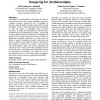Free Online Productivity Tools
i2Speak
i2Symbol
i2OCR
iTex2Img
iWeb2Print
iWeb2Shot
i2Type
iPdf2Split
iPdf2Merge
i2Bopomofo
i2Arabic
i2Style
i2Image
i2PDF
iLatex2Rtf
Sci2ools
113
click to vote
CANDC
2009
ACM
2009
ACM
Discovery is never by chance: designing for (un)serendipity
Serendipity has a long tradition in the history of science as having played a key role in many significant discoveries. Computer scientists, valuing the role of serendipity in discovery, have attempted to design systems that encourage serendipity. However, that research has focused primarily on only one aspect of serendipity: that of chance encounters. In reality, for serendipity to be valuable chance encounters must be synthesized into insight. In this paper we show, through a formal consideration of serendipity and analysis of how various systems have seized on attributes of interpreting serendipity, that there is a richer space for design to support serendipitous creativity, innovation and discovery than has been tapped to date. We discuss how ideas might be encoded to be shared or discovered by ‗association-hunting‘ agents. We propose considering not only the inventor‘s role in perceiving serendipity, but also how that inventor‘s perception may be enhanced to increase the ...
| Added | 28 May 2010 |
| Updated | 28 May 2010 |
| Type | Conference |
| Year | 2009 |
| Where | CANDC |
| Authors | Paul André, m. c. schraefel, Jaime Teevan, Susan T. Dumais |
Comments (0)

